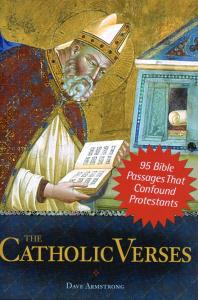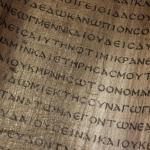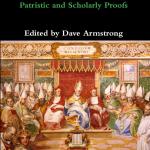[see book and purchase information]
The late Steve Hays (1959-2020) was a Calvinist (and anti-Catholic) apologist, who was very active on his blog, called Triablogue (now continued by Jason Engwer). His words will be in blue.
*****
Steve Hays wrote an article on 11 July 2009 entitled, “Scripture-twisting for Catholicism.” It was a “response” to my article, “Paul Prayed for Dead Onesiphorus (Protestant Commentaries).” Per his usual pathetic modus operandi, Steve didn’t see fit to link to my article, so people could see 1) exactly what he was responding to, and 2) another (Catholic) perspective, backed up in this instance to various degrees by Protestant commentators. I suppose that was asking too much of him. We know that no such fairness was extended, since 1) Steve was anti-Catholic, and 2) personally detested me. Just five days after he wrote this article, after all, he described me as “hypersensitive, paranoid, an ego-maniac, with a martyr and persecution complex” (7-16-09), and three months earlier (4-13-09), I was, according to him, supposedly a “narcissistic little jerk” and “actually evil”.
With such a view, we would fully expect to see bans and blocks. I tried to make some kind of response in the combox. If you take a look at it, you’ll see that the words, “Comment has been blocked” appear four times. That was me, of course. Readers can see many asinine anti-Catholics in the combox insulting me in their usual inane, vapid fashion. None of this behavior and action suggests a confidence in their own viewpoints, does it? The confident person who understands and can defend his or her view and critique others, has an open-minded, “bring it on” approach, and isn’t scared to link to opposing views, to attempt to rebut them point-by-point, or to allow the opponent to have their say in comboxes underneath critiques.
I want people to be aware of how self-defeating, absurd views like anti-Catholicism cause otherwise rational folks to become irrational, and also (usually) how they tend to cause them to express personal derision and detestation — if not sometimes outright hatred — towards Catholics. That‘s why I bring these things up. It reveals a great deal and casts doubt on the credibility of those who publicly express such slanderous thoughts. They can’t even rise to rudimentary Christian ethical standards. Wouldn’t it have been nice if Steve Hays had actually fully addressed and interacted with my article? But here is what he stated, with my replies:
2 Timothy 1:16-18 (RSV) May the Lord grant mercy to the household of Onesiph’orus, for he often refreshed me; he was not ashamed of my chains, [17] but when he arrived in Rome he searched for me eagerly and found me — [18] may the Lord grant him to find mercy from the Lord on that Day — and you well know all the service he rendered at Ephesus.
2 Timothy 4:19 Greet Prisca and Aq’uila, and the household of Onesiph’orus.
1) If Paul shared the Catholic view of Purgatory, then why would he merely offer a prayer in passing for the departed soul of Onesiphorous? Wouldn’t we expect Paul to celebrate a requiem mass on behalf of Onesiphorus?
2) Likewise, why doesn’t Paul pray to Mary, Queen of Heaven, to intercede on behalf of Onesiphorus?
He may have done either thing or both. We simply don’t know. The text doesn’t say one way or another. Thus, Steve’s argument is a weak and insubstantial one from silence. The biblical text states that Paul prayed that God would have mercy on Onesiphorus on judgment day. This is what Hays had to grapple with, if he wanted to argue like a serious Calvinist apologist, seeing that Calvinism rejects the view that Christians ought to pray for the souls of departed human beings. Why did Paul pray for a dead person?! How can this be?! But he doesn’t ever really do that. He skirts around the edges of the discussion, obfuscates, engages in cynically hostile and intellectually unserious obscurantism, and sophistry. This is what he almost always did when “engaging” Catholic arguments.
3) It’s striking to see the way in which Armstrong misquotes Guthrie, to plant the false impression that Guthrie supports his interpretation. To the contrary, Guthrie is summarizing an interpretation he disagrees with as a preliminary step to then present his contrary interpretation.
It didn’t take long before the utterly unfounded attacks against my intellectual honesty began. Of course I did no such thing, and I think Steve was more than intelligent enough to know that. Thus, this amounts to a deliberate lie. I never stated that Donald Guthrie supported my interpretation. Nor did I even imply it. I simply cited ten Protestant commentators with regard to this issue, who exhibited the usual partial agreement and partial disagreement. Guthrie was cited precisely because of his witness concerning what other Protestant commentators believed, in agreement with Catholicism:
Since it is assumed by many scholars that Onesiphorus was by now dead, the question has been raised whether this sanctions prayer for the dead. Roman Catholic theologians claim that it does. Spicq, for instance, sees here an example of prayer for the dead unique in the New Testament. Some Protestants agree with this judgment and cite the Jewish precedent of 2 Macc 12:43-45 . . .
The point here is Guthrie noting that “many [Protestant] scholars” hold that “Onesiphorus was by now dead.” It follows (if they are correct) that Paul prayed for a dead man, and Guthrie, though he disagrees with the conclusion, notes that “some” Protestants think this exhibits prayer for the dead. I did exactly the same thing in citing evangelical (?) / open theist John E. Sanders, writing, “Some scholars contend that 2 Timothy 1:16-18 contains a reference to praying for the dead . . .” [my italics].
Did I claim that Sanders himself believed this? No. He — like Guthrie — was cited as a “hostile witness,” which is always a good argument, because we know such a person has no bias in favor of the Catholic position, and is simply citing facts about what some other fellow Protestant scholars believe. But Hays (due to his seething contempt, I say) apparently had a hard time grasping the nature of my argument, and so could only accuse me of misquoting Guthrie, and by logical extension, also Sanders. It’s a bum rap!
4) Armstrong also passes over in silence the various commentators who take issue with his interpretation (e.g. Knight, Liefeld, Marshall, Mounce, Towner).
This is just stupid. I was not obliged to cite every Bible scholar alive and dead with regard to the passage in question. The point of my paper was to show that some Protestant commentators agree that it is consistent with an interpretation that Paul was praying for the dead; therefore, not only Catholics believe that Paul prayed for dead Onesiphorus. Obviously other Protestants disagree. It’s doubly foolish for Steve to make this charge, in light of the fact that I had already done some of what he called for, five years earlier, in one of my books, which I alluded to in the first part of the article:
I have written about this issue in the past; notably in my book, The Catholic Verses [2004], pp. 169-174, and in A Biblical Defense of Catholicism [2003; completed in 1996], pp. 141-143.
In the former work, I addressed and critiqued nine very prominent Protestant commentators: all of whom disagreed with the Catholic interpretation to some extent, or a great extent. This was the very purpose of that book: to analyze how Protestants attempt to deal with ostensibly “Catholic verses” in the Bible. I summarized the data in a chart and then gave my $00.02 cents’ worth:
To summarize this somewhat amusing confusion and catalogue of evasive and rationalizing techniques, and what to do when faced with a Bible text utterly at odds with one’s own theology, I offer the following chart:
Commentator …………….Was Onesiphorus Dead?……..Did Paul Pray?
New Bible Commentary ……………….Possibly …………………………….Yes
Jamieson, Fausset, Brown …………….No …………………………………….Yes
A.T. Robertson …………………………….“Apparently” ……………………..“Wishing”
Int. Standard Bible Encyclopedia…..Possibly ……………………………“Pious wish”
New Bible Dictionary ……………………No position ……………………….Yes
Adam Clarke …………………………………No position ……………………….Maybe
Matthew Henry …………………………….Probably not ………………………Yes
Albert Barnes ……………………………….No ……………………………………..Yes
John Calvin ………………………………….No ……………………………………..YesThe tally of nine prominent examples is as follows: “apparently dead” (one), “possibly dead” (two), agnostic position (two), “probably not dead” (one), and “not dead” (three). That’s about even, depending on how one grades the undecided votes. As for whether Paul prayed, that is less uncertain: “yes” votes (six), “maybe” (one), and description of his sentiments as “wishing” (two).
On the question of how possible or likely it is that Paul prayed for the dead, three rule it out altogether, holding that Onesiphorus was alive; two do not state whether they believe he was alive, so we cannot determine their position; one allows a distinct possibility, another, a slight one, and two admit some possibility, depending on whether one construes “wishing” as synonymous or similar to prayer.
All this confusion and disagreement suggests that Protestants really have no coherent explanation of this passage and that (quite possibly, given oft-evidenced hostility to Catholicism in these same writers) the desperation and strained nature of much of this interpretation is indicative of their attempts to avoid arriving at conclusions harmonious with Catholic theology. (pp. 173-174)
Ironically, Guthrie was actually mentioned, since he wrote the relevant portion of The New Bible Commentary. He partially agrees with us, as I explained:
The well-known Evangelical Protestant work, The New Bible Commentary (Guthrie, 1178; commentary by Guthrie himself) takes the astounding position that Onesiphorus is probably dead (citing 2 Tim. 4:19), yet holds that Paul was praying for his conduct during life; thus avoiding any implication of prayer for the dead. One might say that this is a distinction without a difference. (pp. 170-171)
I had also cited Guthrie, Robertson, and Jamieson, Fausset, & Brown in A Biblical Defense of Catholicism. Steve made the potshot that I passed “over in silence” those commentators who disagree with me (implying that I was scared to deal with them). In this particular article I didn’t deal with them, since I had no intellectual obligation to do so. But in both of my books above I did straightforwardly address and critique those commentators who disagree with us (in toto or in part).
Later on, I wrote the article, Was Onesiphorus Dead When Paul Prayed for Him?: Data from 16 Protestant Commentaries (1992-2016) [3-20-17]. Here I distinguished between five of the commentaries that regarded Onesiphorus as “dead or likely dead” and eleven that took a “possibly dead or neutral stance.” But Steve Hays gave no argument whatsoever, either way. His only goal was to attack my intellectual integrity and competence as a researcher (and to allow the usual childish mocking by his sycophants in the combox). I address the issue head on. But he merely skirts it and unseriously plays with it.
5) Assuming, for the sake of argument, that this is a prayer for the dead, how are the specifics of this prayer consistent with Catholic dogma?
At least he is now being semi-serious, but I would argue that it is a rather poor and poorly thought-through objection. Paul appears here to be praying for Onesiphorus in a sense that even Lutherans, Anglicans, and Methodists agree with. Martin Luther wrote:
[S]ince God has not permitted us to know, how it is with the souls of the departed and we must continue uninformed, as to how he deals with them, we will not and cannot restrain them, nor count it as sin, if they pray for the dead. For we are ever certain from the Gospel, that many have been raised from the dead, who, we must confess, did not receive nor did they have their final sentence; and likewise we are not assured of any other, that he has his final sentence. Now since it is uncertain and no one knows, whether final judgment has been passed upon these souls, it is not sin if you pray for them; but in this way, that you let it rest in uncertainty and speak thus: Dear God, if the departed souls be in a state that they may yet be helped, then I pray that thou wouldst be gracious. And when you have thus prayed once or twice, then let it be sufficient and commend them unto God. For God has promised that when we pray to him for anything he would hear us. . . . the prayer of the heart, of devotion and of faith; . . . will help the departed souls if anything will. (Sermon for the First Sunday after Trinity; Luke 16:19-31, 1522-1523; in Sermons of Martin Luther, The Church Postils; edited and partially translated by John Nicholas Lenker, 8 volumes. Volumes 1-5 were originally published in Minneapolis by Lutherans of All Lands, 1904-1906. This sermon is found in vol. 4)
It is enough to pray God once or twice for her [his dead wife], as He has said to us: “Whatsoever ye ask, believing, ye shall receive.” If we keep always praying for the same thing it is a sign that we do not believe that our first prayers are answered, and unbelieving prayers only anger Him. (To Bartholomew von Starenberg, 1 Sep. 1524; in Luther’s Correspondence and Other Contemporary Letters, Vol. II: 1521-1530; translated and edited by Preserved Smith and Charles M. Jacobs [Philadelphia: The Lutheran Publication Society: 1918])
As for the dead, since Scripture gives us no information on the subject, I regard it as no sin to pray with free devotion in this or some similar fashion: “Dear God, if this soul is in a condition accessible to mercy, be thou gracious to it.” And when this has been done once or twice, let it suffice. (Confession Concerning Christ’s Supper, Feb. 1528, tr. Robert H. Fischer; in Luther’s Works, vol. 37)
Luther’s successor Philip Melanchthon wrote in 1530 in his Apology to the Augsburg Confession (article XXIV, 94), which is binding on Lutherans:
Now, as regards the adversaries’ citing the Fathers concerning the offering for the dead, we know that the ancients speak of prayer for the dead, which we do not prohibit; . . .
John Wesley, the founder of Methodism, believed in prayer for the dead (see several examples).
C. S. Lewis, the famous Anglican apologist, believed in praying for the dead and in purgatory (see several examples).
Is Paul’s prayer “consistent with Catholic dogma”? Absolutely, for the simple reason that Paul didn’t know with certainty whether Onesiphorus was eschatologically (finally) saved or not. He’s praying for his soul, to be saved, just as he often prayed for those he knew on earth to be saved in the end.
Paul is praying that Onesiphorus will find mercy on the Day of Judgment. But if Onesiphorus went to Purgatory when he died, then it’s a sure thing that he will find mercy on the Day of Judgment. By definition, Purgatory is reserved for heaven-bound decedents (in Catholic dogma).
Correct, but again, Paul didn’t know for sure whether he was saved (in which case he likely would have gone to purgatory, but maybe not). Because of this lack of knowledge about his status, he prays for his soul to be saved. Steve erroneously assumes that Paul, and by extension all Catholics, somehow have or claim infallible knowledge about the fate of departed souls. So, nice try, but no cigar.
Praying for the dead in Purgatory is a prayer to hasten their progress in Purgatory. To expedite their entrance into heaven. It’s not a prayer for postmortem salvation–as if their eternal fate still hangs in the balance.
Indeed that is true (complete with one of Steve’s patented incomplete sentences). But Steve assumes (with no evidence, and none even proffered) that Paul is praying for him to be released from purgatory, rather than praying for his salvation. The actual text strongly suggests the latter and is silent on the former. If that is so, then all of this is a moot point, which was usually the only kind of point that Steve made, when addressing the topic of any and all Catholic beliefs. Catholics are free to pray for the salvation of a soul (whose final destiny we are not certain of), or for a quicker release from purgatory, if indeed the soul is in purgatory (which we can’t know for certain). The two are not mutually exclusive. There is no problem here. Steve only mistakenly thought there was a supposed difficulty, because, as usual, he didn’t properly understand Catholic theology.
He surely does now, though. No more games. Please pray for his soul.
*****
*
*
Summary: The late Calvinist Steve Hays tried to vainly argue that I was dishonest and out to sea in arguing that St. Paul prayed for the dead man Onesiphorus (2 Tim 1:16-18).














